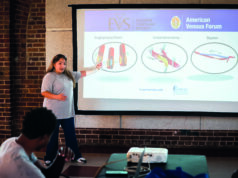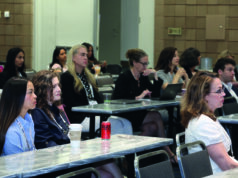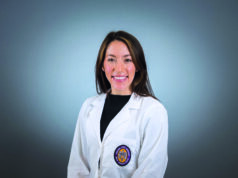 Among the posts catching Vascular Specialist readers’ eyes last month were the digital flipbook version of our March print edition, a new study looking at the Society for Vascular Surgery (SVS) open abdominal aortic aneurysm (AAA) recommendations, and an interview with one of the founders of a novel vascular scaffolding device to treat peripheral arterial disease (PAD). March’s top 10 also included a story covering new VenoValve data, and a video interview with Ulka Sachdev-Ost, MD, focused on diversity.
Among the posts catching Vascular Specialist readers’ eyes last month were the digital flipbook version of our March print edition, a new study looking at the Society for Vascular Surgery (SVS) open abdominal aortic aneurysm (AAA) recommendations, and an interview with one of the founders of a novel vascular scaffolding device to treat peripheral arterial disease (PAD). March’s top 10 also included a story covering new VenoValve data, and a video interview with Ulka Sachdev-Ost, MD, focused on diversity.
1. Vascular Specialist—March 2022
Our April print issue featured several stories reported from the 2022 annual meeting of the American Venous Forum (AVF) in Orlando, including “Dedicated vs. non-dedicated,” a piece looking at talks in which researchers placed venous stenting under the spotlight.
2. Study ‘supports’ SVS open AAA volume recommendations
A multicenter, retrospective database analysis suggested improved open AAA outcomes when surgeon volume is greater than seven cases yearly and performed in hospitals with a 30-day mortality rate less than 5%.
3. AVF 2022: VenoValve improvement ‘maintained’ for 2.5 years without adverse events
Envveno Medical announced positive 30-month data from the first-in-human trial of the VenoValve bioprosthetic potential venous valve replacement during the 2022 American Venous Forum (AVF) annual meeting (VENOUS2022) held in Orlando, Florida (Feb. 23–26).
4. Potential ‘new paradigm’ in treatment of long occlusive lesions emerges
Lewis Schwartz, MD, spoke to us as one of the co-founders behind a novel, balloon-expandable, resorbable, drug-eluting device, which featured among the scientific presentations at last year’s annual meeting of the Midwestern Vascular Surgical Society (MVSS) in Chicago.
5. Writing and reviewing in the DEI space: Progress evident but ‘there’s a lot of work to do’
In a video interview, Ulka Sachdev-Ost, MD, sat down with us to speak about her role as diversity, equity and inclusion (DEI) editor on the Journal of Vascular Surgery (JVS). She outlined milestones reached and how her journey as the first-ever JVS diversity editor had evolved in her time at the helm.
6. Silence is golden—but does self-imposed silence lead to burnout?
Last month, readers flocked to our February edition guest editorial by Bhagwan Satiani, MD, who asked: “Silence is golden—but does self-imposed silence lead to burnout?”
7. SCVS 2022: ‘We should not allow our industry relationships influence how we choose to treat patients’
Industry players and device makers have helped spark new science and innovation in vascular surgery amid flatlining National Institutes of Health (NIH) funding, but physicians must pay heed to the conflicting agendas in the partnerships formed with these companies, a focus session on ethical issues in practice at the 2022 annual symposium of the Society for Clinical Vascular Surgery (SCVS) in Las Vegas (March 19–23) heard.
8. Houston, we have a dialysis access problem
The concept of dedicated vascular access centers fueled a turbocharged Texan tussle with Karl Illig, MD, of Flow Vascular Institute in Houston, who took on Eric Peden, MD, an associate professor of cardiovascular surgery at Houston Methodist Hospital, in a no-holds-barred debate on how best to deliver longitudinal patient care. The burning question was: who will patients call with “Houston, we have a (dialysis access) problem”?
9. F/BEVAR review reveals less than 20% of patients suffered intraoperative adverse event
A retrospective evaluation of 600 fenestrated or branched endovascular aneurysm repairs (F/BEVARs) for the treatment of complex aneurysms revealed that fewer than one in five patients experienced an intraoperative adverse event, according to a new study published in the March 2022 edition of the JVS.
10. The pandemic has been a challenge, but perhaps it imposed some equity
In our March print issue, guest editorialist Lauren Cralle, BS, pondered the pandemic-imposed birth of the virtual interview for vascular residency applications, writing that the remote mode of assessment “may be the great equalizer to some degree.”












